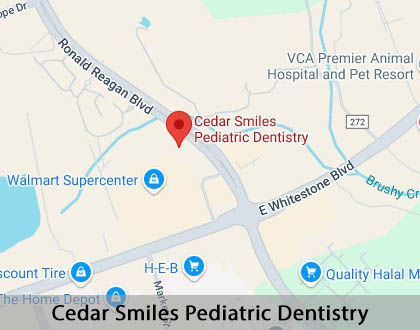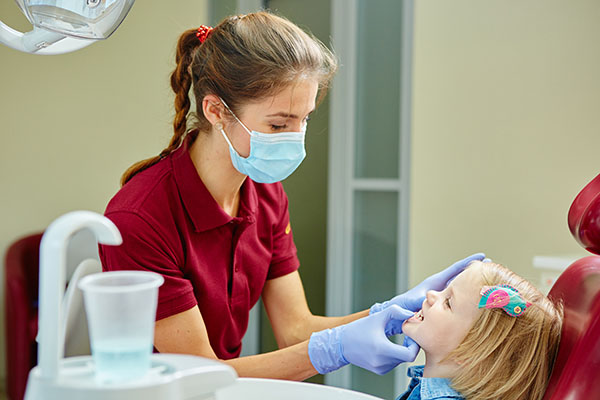Why Choose a Pediatric Dentist Cedar Park, TX
Pediatric dentists, also known as pedodontists, not only love working with teeth but also love working with children and people with special needs. This, along with their additional training, makes them ideal choices for parents seeking regular dental care for their children. There are many reasons parents should consider selecting a pediatric dentist for their child’s dental care.
If you are a parent seeking a dental home for your child, our team can help. Pediatric dentistry is available at Cedar Smiles Pediatric Dentistry in Cedar Park and the surrounding area. We offer a range of services geared toward children. Call us at (512) 808-5666 to learn more.
Pediatric Dentists Receive Special Training Beyond General Dentistry
A pediatric dentist has graduated from dental school, attended a specialized pediatric dentistry residency, and been board-certified in pediatric dentistry. A pediatric dental residency generally lasts two to three years. During the residency, pediatric dentists undergo training specific to working children’s small mouths and use specific, child-friendly technologies. They also can provide certain forms of anesthesia to children.
“A pediatric dental residency generally lasts two to three years.”
Parent and Child Education
A major part of a pediatric dentist’s job involves providing education to both parents and their children about maintaining the health of their teeth and the structures of the mouth. It is very important to promote good oral hygiene early on in life. Studies show that poor dental health negatively affects a child’s school performance.
Pediatric dentists can teach children tips and tricks to help them succeed in taking care of their teeth. Pediatric dentists can also help educate parents about childhood habits that may influence the growth and development of a child’s teeth and mouth structures, such as using a pacifier, thumb-sucking, or nail-biting.
“Pediatric dentists can also help educate parents about childhood habits that may influence the growth and development of a child’s teeth, such as using a pacifier, thumb-sucking, or nail-biting.”
Office Visits are More Fun and Geared Toward Children
A pediatric dentist’s office tends to look much different than that of a general dentist. Pediatric dental offices will often be bright and colorful or decorated with specific themes that aim to make dental visits fun, inviting, and less intimidating. Many pediatric dental offices offer prizes at the end of each visit as an incentive for children to stay engaged and optimistic.
Pediatric dental offices may also have televisions incorporated into their experience, such as in the waiting room or even in exam rooms. Since pediatric dentistry stays very age-specific, many offices will have dedicated office furniture and equipment specifically made to suit a child’s size.
“Many pediatric dental offices offer prizes at the end of the visit as an incentive for children to stay engaged and optimistic.”
Check out what others are saying about our dental services on Yelp: Why Choose a Pediatric Dentist in Cedar Park, TX
Pediatric Dentists Enjoy Working with Children
Pediatric dentists genuinely enjoy working with children, youth, and people with special needs. Pedodontists remain passionate about establishing good habits to avoid the development of tooth decay or gum disease, and they enjoy helping their patients with their changing needs as they grow older. Pediatric dentists stay highly motivated. Since they have undertaken two to three extra years of dental education to become pediatric specialists, their enthusiasm remains evident.
“Pedodontists remain passionate about establishing good habits to avoid the development of tooth decay or gum disease, and they enjoy helping their patients with their changing needs as they grow older.”
Questions Answered on This Page
Q. What type of special training do pediatric dentists receive?
Q. What kind of education do pediatric dentists provide to patients?
Q. What does a pediatric dentist’s office look like?
Q. What do pediatric dentists like about their job?
Q. What kind of extra training does a pediatric dentist undergo?
People Also Ask
Q. What is the importance of brushing your teeth?
Q. What foods should children eat to promote good oral health?
Pediatric Dentists Have Additional Training
After general dental school, pediatric dentists receive two to three additional years of training. This extra training includes advanced education about diagnostic procedures and surgical training geared toward working with the small structures of a child’s mouth. Pediatric dentists may also receive additional training within the following areas according to the American Academy of Pediatric Dentists:
- Child psychology, behavior, and development
- Pediatric oral pathology
- Pediatric pharmacology
- Pediatric radiology
- Management of pediatric oral-facial trauma
- Caring for patients with special health care needs
- Pediatric sedation and general anesthesia
“This extra training includes advanced education about diagnostic procedures and surgical training geared toward working with the small structures of a child’s mouth.”
Frequently Asked Questions
Q. When should a child start visiting a dentist?
A. According to a report published by the American Academy of Pediatrics, children should establish a dental home by the age of one. Some dental professionals recommend the first dental visit be by one year or six months after the first tooth becomes visible. Following this guideline establishes good oral care early on, helping prevent cavities or gum disease development.
Q. How often should a child see a pediatric dentist?
A. Children should see a dentist about as often as adults. The American Academy of Pediatric Dentistry recommends a visit for a routine check-up every six months. Visit frequency may be different depending on a child’s specific needs.
Q. Can a pediatric dentist give sedation to a child?
A. Yes. Pediatric dentists have additional training that makes them certified to help their patients tolerate treatments more easily using sedative medications. Pediatric dentists commonly use nitrous oxide sedation, but other methods are available.
Q. Does a pediatric dentist only see children?
A. A pediatric dentist may see more than just children. The majority of their patients will be children. However, they are also trained to see patients who have special health care needs.
Q. How does one find a pediatric dentist?
A. The most popular method is word-of-mouth. Parents can get recommendations from friends, family, or their child’s pediatrician. The internet is another excellent resource. It allows parents to read online reviews of pediatric dentists in the area.
Quality Pediatric Dental Services Can Transform Smiles
By visiting us as soon as possible, our team can help get your child the professional treatment they need.
Definition of Pediatric Dental Terminology
Call Us Today
Routine visits to a pediatric dentist can be just as critical to maintaining a child’s health as regular visits with a medical pediatrician. Parents interested in pursuing pediatric dentistry can learn more by contacting our team at 512-808-5666 today.
If you live in the Cedar Park area, call 512-808-5666 for an appointment in our Cedar Park office.
Helpful Related Links
- American Dental Association (ADA). Glossary of Dental Terms. 2024
About our business and website security
- Cedar Smiles Pediatric Dentistry was established in 2017.
- We accept the following payment methods: American Express, Cash, Check, Discover, MasterCard, and Visa
- We serve patients from the following counties: Williamson County, Travis County and Hays County
- We serve patients from the following cities: Cedar Park, Leander, Round Rock, Georgetown, Liberty Hill, Austin, Hutto, Dripping Springs, Pflugerville and Lago Vista
- Norton Safe Web. View Details
- Trend Micro Site Safety Center. View Details







